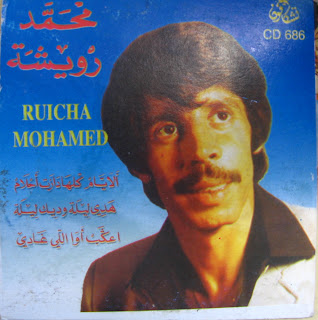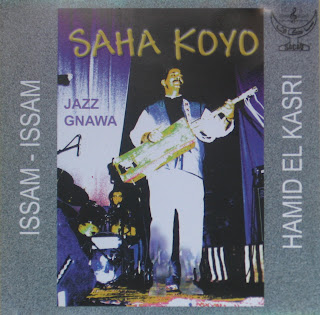Traveling street musician in Khenifra, Morocco. April, 2012.
Moroccan Street Sounds
Choice cuts from Morocco
Tuesday, August 7, 2012
Saturday, August 4, 2012
Mohamed Rouciha
Track 1
Track 2
Track 3
Track 4
Track 5
Track 6
More superb Mohamed Rouicha on the MasterOne label. Similar to the Inass Inass record, but with shorter songs and a hint of autotune on the female chorus.
Slow, hypnotic rhythms beat out on buzzing bendirs hand drums provide the backdrop for Rouicha's virtuosic outar playing. Highly recommended.
Friday, August 3, 2012
Nass El Ghiwane Sinia
Ouach Hna Houma Hna
The form of Moroccan music known as chaabi, which translates as, simply, "popular", now covers a large range of styles but began as a type of street music, performed in public markets and squares. However, by the 1970s, chaabi bands were pushing the music in a more sophisticated direction, combining Berber music with rituals from the milhun (a semi-classical form of sung poetry) and Sufi traditions, gnawa rhythms, reggae, and an image influenced by the international rock scene. (Might this be what led Martin Scorcese to later dub them the "Rolling Stones of North Africa"?) These new-era chaabi groups provided a distinctively Moroccan alternative to the imported Egyptian, Lebanese and Syrian musical styles which had been dominating Morocco's music culture at the time.
Arguably the most popular and well-respected (and also most political) chaabi group to emerge in this era was Nass El Ghiwane. Formed in Casablanca, and led by Hgnur Boujmia, Nass El Ghiwane took their name from the ghiwane, a tradition of traveling musical actors, and used the language of the street to address socially relevant topics. The initial impact of Nass El Ghiwane and other seminal chaabi groups had a major influence on the rai music of Algeria and is still being felt in the contemporary Moroccan chaabi scene.
This song comes from their early album, Sinia, recorded before their lead singer, Boujmia, died in a car crash in the early 1980s. Boujmia's powerful vocals feature on Oauch Hna Houma Hna, accompanied by banjo, sintir and percussion. Sentir, Banjo: Moulay Abdelaziz Allal
Bendir, Daadouh: Hgnur Boujmii
Bendir, Daadouh: Omar
Tbila: Larbi
Thursday, August 2, 2012
Tuesday, July 31, 2012
Itrane Atlas
Aziz Ahouzar--Aya Hbibino Wayadbibno
Mimoun El Khnifri--Immane Wa Ymma
Mohamed Aankour--Illa Wghamos Ni
Tiotmine Imazighn--Makh Adiyi Tzrid
Houssa 46--Imorag T3adbiyi
Aziz Ahouzar--Azghanghan Anjdi
Mohamed Aankour--Aboulahmoum
Compilation of new Moroccan Berber chaabi ("pop") music on the Box Music label out of Casablanca. Features Aziz Ahouzar, Mimoun El Khnifri, Mohamed Aankour, Houssa 46, and others.
Lo-fi, sytnhed-out, autotuned Berber pop for your listening pleasure.
Wait, Makh Adiyi Tzrid is in what time signature?
Houssa 46
Track 2
More Berber chaabi ("pop") music from Houssa 46, this time on the Raissiphone label.
Monday, July 30, 2012
Hamid El Kasri Saha Koyo
Laylaha Illalah
Salaba
Hamid El Kasri's brand of gnawa music, a fusion he's dubbed "Jazz Gnawa" doesn't always succeed but when it does, it's sublime. This album contains the masterpiece Laylaha Illalah, also issued on the compilation Festival D'Essouira, an annual anthology that accompanies the Essouira Gnawa Festival in June.
Voice, Guembri: Hamid El Kasri
Keyboards, Congas, Drums: Issam-issam
Chorus, Karkabas, Claps: Aziz Boughaba, Seddik Bassouda, Mohamed Majdoubi
Hassania
3yana u Mrida
track 3
track 5
Hassania takes center stage on this album issued on the MasterOne label in Fes. Hassania's powerhouse vocals are the highlight, thundering out across the clean, buoyant sonic landscape.
Friday, July 27, 2012
Mohamed Rouciha Inass Inass
Side 1
Side 2
Inass Inass
Mohamed Rouciha's best album. Features his hit song, Inass Inass, and contains three more songs of outstanding quality. Released on the MasterOne label out of Fes, this tape finds Rouicha's outar (African lute; similar to the loutar, but smaller) playing at its fiercest. Gritty vocals and raw, echo-drenched production. Middle Atlas Berber chaabi ("popular") music at its finest.
The intro on Track 3 is ridiculously bad ass. R.I.P. Mohamed Rouicha (born January 1, 1950, died January 17, 2012).
Subscribe to:
Posts (Atom)







